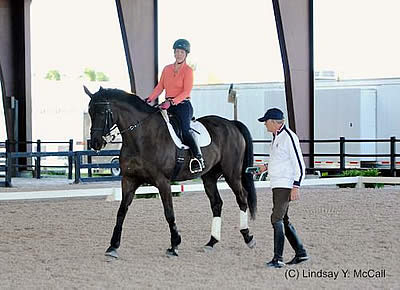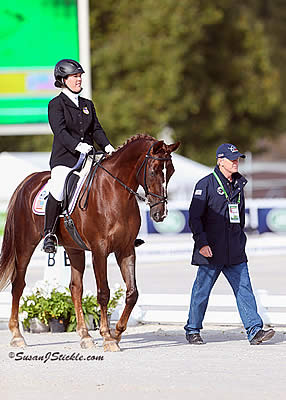Roxanne Trunnell works with U.S. Chef d’Equipe Kai Handt. Photos by: Lindsay Y. McCall.
Wellington, FL – January 16, 2016 – Following an exciting CPEDI3* show at the Adequan® Global Dressage Show Grounds in Wellington, Florida, Para-Dressage riders participated in the USEF Para-Equestrian Dressage High Performance Symposium Develop the Coach Program. The symposium took place in the Van Kampen Arena January 10-12, 2016. Riders were treated to both lecture and riding sessions taught by FEI International 5* Dressage Judge Carlos Lopes of Portugal and U.S. Chef d’Equipe Kai Handt. The symposium included a collaborative coaching model where equestrians could learn and refresh their knowledge and skills alongside their own coaches while being instructed by Lopes or Handt. These Para-Dressage symposiums have been an integral part of educating and growing the high performance sport of Para-Equestrian Dressage. Riders of all skill levels were encouraged to participate in the Develop the Coach Program.
USEF High Performance Director of Para Equestrian & Vaulting Laureen Johnson commented, “The athletes are always thrilled with the opportunity to attend a symposium with 5* Para Dressage judge Carlos Lopes and USEF Para Dressage Chef d’Equipe, Kai Handt. Lopes expressed how impressed he was with the evolution of the U.S. Para Dressage program, seeing progress in the technical skills of the athletes. The interest in Para Dressage is growing rapidly and we couldn’t be more pleased with the recent performances of the U.S. athletes in national and international competition in preparation for the 2016 Paralympics.”
The symposium began with a lecture session provided by Lopes and Handt. The international duo talked about rules, Para-Dressage theory, scales of training, quality of test movements, and much more. Lopes began the lecture by reviewing the FEI Rules and the warm-up time allowed for Grade Ia, Ib, and II. He also talked about when the actual show begins and when rules are enforced. Lopes noted, “It’s important to plan out how you will use your time in the warm-up with your coach. So when you are ready to enter the ring you have prepared yourself and your horse to the maximum. You don’t want to over warm up your horse but you don’t want to bring a horse into the ring that could have used another 5 minutes.”
Another rule that Lopes went over was what you should do when something technically goes awry in the ring that is not under your control. For example, a speaker falls, the electricity goes out, or a tent ends up in the middle of the ring. Lopes said it can hurt you if you keep going. You will want to stop. Everything from the beginning of your test to the moment you stopped will be judged. Once the issue has been fixed, you will be judged from that moment on. If you were to keep going when the technical issue occurs your scores will count which could affect your score.”
Lopes and Handt also discussed about creating the best image possible for you and your horse. Not only around the show grounds but when you enter the ring.
Lopes noted, “As a judge you are not disabled; you are a rider that is able to perform or not able to perform. We don’t care about your disability; we just want to see in your grade how able you are to do it.”
Handt added, “You have to think about what the FEI had in mind when they made these tests. What do they want to see, what do they want you to prove on your tests? Think about what the test was made for.”
Lopes and Handt went over what it takes to reach each score of a 6, 7, 8, and 9. Lopes explained, “You have to ride your corners properly. It makes a big difference when preparing the horse for the next exercise. If you miss the corner you are taking points away from your exercise.” You also want to look where your transitions are. Ask yourself if they are in the right place. Ask yourself if the judge can clearly see the transition. Handt added, “Look where you are going. Dressage is a forward sport so you have to think forward and look for the next two moves.”
Following the first day informative lecture, riders took part in practical sessions with Lopes on the second day. Handt worked the riders in practical sessions on the final day going over their freestyles and more technical parts of their tests. Each participant rode for 45 minutes in the collaborative coaching model where their coaches worked alongside Lopes and Handt.

International athletes both beginning Para Dressage and veterans attended the three day clinic. Grade III U.S. rider Pam Hardin who showed in the CPEDI3* enjoyed working with both Lopes and Handt. Hardin began riding in Para Dressage just a few years ago. She and her coach have attended multiple high-performance symposiums.
“It was amazing,” stated Hardin. “I really felt like I finally put some pieces together that we were working on at home but really weren’t congealing. Specifically the exercises with the small 10 meter circles and large 20 meter circles on the canter. We also worked on extending and bringing my horse back. We’ve been working on getting me to sit better and deeper and Carlos did a fabulous job communicating in a way I really understood. This was absolutely so important to have following the CPEDI3*. I love the mix of collaborative coaching because the trainer tells you everyday things to do and my trainer does a wonderful job but, sometimes a clinician will come up with a certain way to say that same thing that makes it click.”
Hardin added, “I enjoyed going over the rules on the first day of this symposium. I am a reader of the rules, but the rules can be treacherous to navigate so it was very nice to get answers to specific questions I had. For example I had always wondered if something happened in the freestyle, do I catch up to my music or not. It was nice to get that question answered.
“The final day with Kai built nicely on the work with Carlos Lopes, giving me specific help with specific areas,” stated Hardin. “Each of them homed in on controlling forward movement to be able to get Quaterjack’s wonderful gaits while still being capable of showing distinct transitions, something I struggled with in the CPEDI.”
Hardin concluded, “This symposium was amazing. I left with targeted instruction and can’t wait to show improvement next week. To be able to show, have the clinic, train, and then come back and show again is so exciting.”
Following the USEF Para-Equestrian Dressage High Performance Symposium Develop the Coach Program is the Para-Dressage Tour $10,000 CPEDI3*, scheduled for January 21-24, 2016, in the Van Kampen Arena at the Palm Beach International Equestrian Center.
By: Lindsay Y. McCall
To view an online version of this press release with more photos, please visit: http://uspea.org/category/recent-uspea-press-news/.
About United States Para-Equestrian Association:
The USPEA is a network of riders, judges, national federation board members, and equestrian enthusiasts. The association gives athletes the ability to get involved and expand their knowledge and experience in the Para-Equestrian sport. The USPEA encourages para-athletes to participate in all disciplines under the para-equestrian umbrella.
The USPEA is a recognized affiliate of the United States Equestrian Federation (USEF) which serves as the National Governing Body for the equestrian sport. This relationship between the USPEA and USEF is to encourage para-equestrian competitors, leisure riders, coaches, fans and enthusiasts to network and get involved with the entire equestrian sport.
Ultimately the goal of the USPEA is to foster growth in the para-equestrian discipline. From growth in the number of participants to growth as a team, and growth in the experience and knowledge of all involved. From local horse shows to international Olympic Games, the USPEA will provide para-equestrians the knowledge of what they need to succeed. The USPEA connects with the International Olympic Committee (IOC), the Federation Equestre Internationale (FEI), the United States Dressage Federation (USDF), and USEF which provides Para-Equestrians the top equestrian resources.
In June 2010, the USPEA earned its 501 (c)(3) status which has encouraged supporters to help supply funding to the Para-Equestrian Team as a recognized affiliate of the United States Equestrian Federation (USEF).
For more information about the USPEA, please visit www.USPEA.org or contact USPEA President Hope Hand by e-mail: hope@uspea.org or by phone: (610)356-6481.

